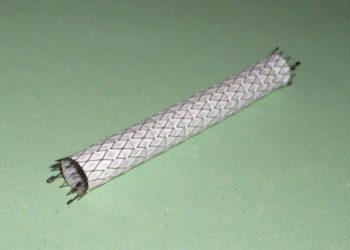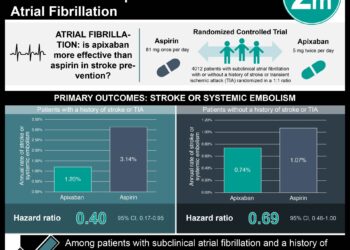Perioperative Aspirin may increase major bleeding in noncardiac surgery (POISE 2)
Image: CC/Wiki
1. Perioperative Aspirin use did not correlate with reduction of death or nonfatal myocardial infarction within 30 days post-operatively.
2. Perioperative Aspirin use increased risk of major bleeding.
3. Aspirin use did not affect the median length of hospital stay.
Evidence Rating Level: 1 (Excellent)
Study Rundown: This study sought to determine the effect of perioperative aspirin on the outcomes of patients undergoing non-cardiac surgeries. As a platelet aggregation inhibitor, it provides a theoretical benefit of decreasing clot driven events such as myocardial infarction. Conversely, it may enhance the risk of bleeding complications. This study presents strong evidence that perioperative Aspirin use for noncardiac surgery does not decrease the risk of death or myocardial infarction within 30 days post-operatively. It was however shown to increase the risk of major bleeding requiring transfusions, albeit minimally with only 0.8% more patients in the Aspirin group having major bleeds. Given the substantial variability in perioperative administration of Aspirin, regardless of whether patient was or was not previously on Aspirin, this study adds strong evidence that Aspirin does not decrease the risk of death or MI, and should therefore not be used for that indication. Strengths of this study are many, including the size of the study, number of hospitals, and countries involved. Patients, physicians, and statisticians were also blinded, all types of noncardiac procedures were included, and studied both patients who previously took Aspirin as well as those who had not. Follow up was complete at 30 days for 99.9% of patients originally enrolled in the trial, further adding to the strengths of its findings.
Click to read the study in NEJM
Click to read an accompanying editorial in NEJM
Relevant Reading: Systematic review of antiplatelet therapy for the prevention of myocardial infarction, stroke or vascular death in patients with peripheral vascular disease
In-Depth [randomized controlled trial]: This study randomized 10,010 patients across 135 hospitals in 23 countries into receiving Aspirin or placebo perioperatively for noncardiac surgery. Patients, physicians, and statisticians were all blinded to randomization result. Patients who were previously taking Aspirin were asked to stop at least 3 days before surgery. Patients took 200 mg of Aspirin or placebo before surgery and continued 100 mg per day for 30 days. Those who were previously on aspirin took the study dose of aspirin or placebo for 7 days post-operatively and then switched back to their original aspirin dose. Death, nonfatal myocardial infarctions, major bleeding, and length of hospital stay was recorded. Death or nonfatal MI’s within 30 days occurred in 7.0% of patients in the Aspirin group and 7.1% of patients in the placebo group (P=0.92). 6.2% of the Aspirin patients had an MI vs. 6.3% in the placebo patients (P=0.85). Risk of major bleeding increased from 3.8% in placebo patients to 4.6% in Aspirin patients (P=0.04). Median length of hospital stay was 4 days for patients in both groups.
More from this author: Insurance status linked to transfer decisions in trauma cases, Drainage from hemopericardium is safe and reduces hospital stay, Preoperative low-dose steroids sufficient for steroid-treated IBD , Negative pressure wound therapy for open abdomens appears safe, Latissimus dorsi tendon transfer are effective long-term
©2012-2014 2minutemedicine.com. All rights reserved. No works may be reproduced without expressed written consent from 2minutemedicine.com. Disclaimer: We present factual information directly from peer reviewed medical journals. No post should be construed as medical advice and is not intended as such by the authors, editors, staff or by 2minutemedicine.com. PLEASE SEE A HEALTHCARE PROVIDER IN YOUR AREA IF YOU SEEK MEDICAL ADVICE OF ANY SORT.







